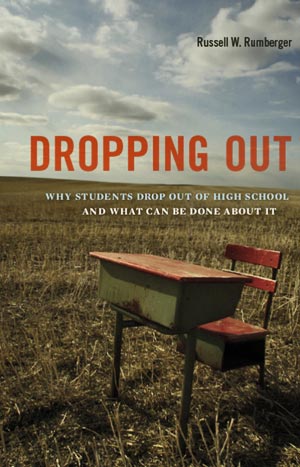
This book addresses one of the greatest challenges facing the US educational system: high school dropouts. The problem has been labeled by some, including President Obama, as a national crisis.
The book investigates all four major facets of the problem: (1) the nature and incidence of the problem; (2) the consequences for both individuals and society at large; (3) the individual and institutional causes of the problem; and (4) solutions.
The investigation uncovers a number of dilemmas and complexities that make understanding and solving America’s dropout crisis more difficult than it might seem. One dilemma concerns the requirements for earning a high school diploma: What should the graduation requirements be for all students, even those who do not want to go to college?
Another concerns the meaning and measurement of dropping out. Although related, dropping out and graduating are not opposite sides of the same coin.
Still another concerns how to determine the causes of dropping out. Some of the characteristics of dropouts that lead them to quit school—such as poor work habits or lack of motivation—may contribute to these poor outcomes outside of school.
So it is often difficult to determine the causal connection between dropping out and subsequent outcomes.
The final chapter discusses current efforts to address the nation’s dropout crisis, including the Obama administration’s efforts to turnaround the nation’s persistently lowest-achieving schools, and why those efforts are insufficient. I argue that to substantially improve the nation’s graduation rate will require more fundamental reforms, such as redefining highs school success to include a broader array of skills and abilities that have been shown to improve labor market performance and adult well-being.
The book provides the most comprehensive investigation of these issues ever undertaken. It draws on a variety of evidence to examine these four dimensions of the dropout problem. I use statistical data to provide a broad, factual overview; research articles and reports are used to provide evidence on the consequences, causes, and solutions.
The book also draws on my own experiences in conducting research on dropouts over the past 30 years, and two specific efforts to do something about it.
Finally, these sources are augmented with personal accounts and quotations from students and dropouts themselves drawn from a number of in-depth case studies that describe the ordeals and challenges facing young dropouts or would-be dropouts in America.
The book is related to and draws on a wide range of theories and research in education and related social science fields, including economics, sociology, demography, political science, and criminology. Many fields provide valuable insights into the four dimensions of the dropout crisis. Economists, for example, have documented the economic flight of high school graduates, including their poor labor market experiences and low lifetime earnings. Economists have also compared the benefits of improving high school graduation rates with the costs of proven interventions, demonstrating the economic payoff to such investments. Criminologists have examined the relationship between dropping out and crime, trying to determine the extent to which crime leads to dropping out and dropping out leads to crime.
This book is a culmination of 30 years of research on high school dropouts. I wrote my first paper on high school dropouts in 1981. And although I have investigated other educational issues over the course of my academic career, including student mobility, school segregation, and education of English language learners, research on dropouts has been dominant.
Most of this work has come in the form of empirical studies and academic papers. But more recently my work has focused on interventions and policy prescriptions. I started the California Dropout Research Project (CDRP) in December 2006 to synthesize existing research and undertake new research to inform policymakers and the larger public about the nature of—and effective solutions to—the dropout problem in California. To date, the project has produced 69 research studies and publications which have been downloaded more than 64,000 times from the project website and lead to a series of bills designed to address the dropout problem, which were passed by the California legislature and signed into law by the governor.
But I decided to write this book also in order to provide a comprehensive summary of the issues and research on the topic that could inform a wide audience with an interest in the problem, including scholars, educators, and policymakers.
The first chapter of the book is only 19 pages—but it provides a useful introduction the topic and complete overview of the book.
The chapter first documents the magnitude of the problem.
According to Education Week, the nation’s leading education periodical, an estimated 1.3 million students from the high school class of 2010 failed to graduate, which represents 30 percent of the 4.3 million students enrolled in the ninth grade in 2006. The dropout problem also varies widely among populations of students and schools. Only 56 percent of Hispanics and 54 percent of Blacks from that class graduated in 2007, compared to 81 percent of Asians and 77 percent of Whites. And Education Week estimates the high school graduation rate for the class of 2007 among the nation’s 50 largest school districts ranged from 40 percent in Clark County, Nevada to 83 percent in Montgomery County, Maryland.
Further, research by Nobel economist James Heckman show that the high school graduation rate is lower than the federal government reports; is lower today than 40 years ago; and disparities in graduation rates among racial and ethnic minorities have not improved over the last 35 years.
The chapter then goes on to document how reducing the number of dropouts has become a national policy concern both inside and outside of the government. Over the last six years, it has received attention from Bill Gates, Oprah Winfrey, and President Obama.
The chapter then discusses, briefly, discusses the three remaining facets of the problem: the individual and social consequences, the causes, and the solutions.
My wish is that this book will prove valuable to all stakeholders with an interest in and a commitment to solving the nation’s dropout crisis.
For scholars, the book provides a comprehensive review of the research literature on dropouts, citing more than 700 references.
For educators, the book provides an overview of the various intervention strategies for solving the dropout crisis, from programmatic interventions that targets students most at risk for dropping out to systemic interventions. It reviews the various methods for determining the effectiveness of educational interventions and the research evidence on the effectiveness of specific interventions. At the same time, it points out some contradictions in several reviews of the research literature.
For policymakers, the book describes current approaches to addressing the dropout problem at the national, state, and local levels; the limitations of these approaches; and five recommendations for addressing the dropout crisis at a more fundamental level.


Russell W. Rumberger is Vice Provost for Education Partnerships, University of California Office of the President, and Professor of Education in the Gevirtz Graduate School of Education at UC Santa Barbara, where he has taught since 1987. Professor Rumberger received a Ph.D. in Education and an M.A. in Economics from Stanford University and a B.S. in Electrical Engineering from Carnegie-Mellon University.